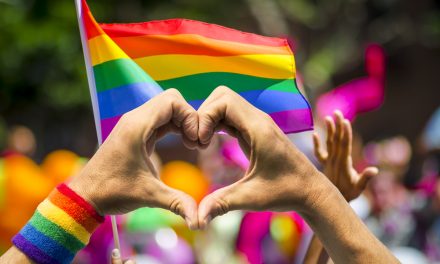(Photo Credits: PeopleImages.com – Yuri A from Shutterstock)
A recent study from the Williams Institute at UCLA School of Law reveals that workplace discrimination against LGBTQ+ employees continues to be an issue, even after the Supreme Court’s 2020 ruling against anti-LGBTQ+ discrimination. The report indicates that coming out at work can still lead to unfair treatment and harassment.
Part of the report’s executive summary reads:
Over 8 million workers in the U.S. identify as LGBT. Employment discrimination and harassment based on sexual orientation and gender identity have been widely documented. Recent research has found that LGBTQ people continue to face mistreatment in the workplace, even after the U.S. Supreme Court held in 2020 that discrimination based on sexual orientation and gender identity is prohibited by Title VII of the Civil Rights Act of 1964. Experiences of workplace discrimination and harassment negatively impact employees’ health and well-being, as well as their job commitment, satisfaction, and productivity. These primary effects can, in turn, result in higher costs and other negative outcomes for employers.
The Supreme Court’s decision in Bostock v. Clayton County was a landmark case that extended Title VII protections to LGBTQ+ employees. However, the new study shows that these legal protections have not fully eradicated workplace discrimination. According to the study, discrimination can have severe consequences. “Experiences of workplace discrimination and harassment negatively impact employees’ health and well-being, as well as their job commitment, satisfaction, and productivity,” the study notes. This not only affects the individuals targeted but also results in negative outcomes for employers.
Based on a survey of 1,902 employed LGBTQ+ adults conducted in the summer of 2023, the study found that “almost half (47%) of LGBTQ employees reported experiencing discrimination or harassment at work (including being fired, not hired, not promoted, or being verbally, physically, or sexually harassed) because of their sexual orientation or gender identity during their lifetime.” Notably, transgender and nonbinary individuals, as well as people of color, reported significantly higher rates of discrimination and harassment than their cisgender and white counterparts.
The fear of discrimination leads many LGBTQ+ employees to remain closeted at work. Nearly half of the survey respondents reported not being out to their current supervisor, and one-fifth were not out to any coworkers. The data also showed that “LGBTQ employees who were out to at least a few coworkers and/or their supervisor were three times more likely to report experiencing discrimination (39% vs. 12%) and more than twice as likely to report harassment (42% vs. 17%) than those who were not out to anyone at work.”
Given these findings, it is clear that coming out at work can increase the likelihood of facing discrimination or harassment. A significant portion of LGBTQ+ employees—one-third—reported leaving a job due to anti-LGBTQ+ actions by employers.
The Williams Institute study emphasizes the need for stronger workplace protections. “Discrimination and harassment negatively impact both employees and employers,” said Brad Sears, the report’s lead author. “More robust protections, including monitoring and enforcement, are needed to ensure that LGBTQ people, particularly trans and nonbinary people and LGBTQ people of color, are fully protected from discrimination and harassment in the workplace.”
In conclusion, these findings suggest that, despite legal progress, much work remains to create truly inclusive and equitable work environments for all LGBTQ+ individuals. Read the study in full here.










. . . So, what else is new, considering where America is these days: politically, culturally and in terms of sexuality and the multiple orientations. I would think that that’s at an all-time high in terms sexism, women, and all spectrums of the gay people in general.
It’s not like we live in vacuum, right, in terms of “White Nationalism” why should ‘we’ be left out of the hated-despised/undesirable category.
According to T.D. Vance, we’re not making babies either, so if it’s up him (the face of the 2025 Project) we won’t be voting either.
useless rhetoric
Ha, FOOLISHLY, for you maybe Maga.
This kool aid leftist propaganda is made for people who lack critical thinking skills and need to feel like victims. A silent majority of us in the community reject it.
useful rhetoric
media is propaganda/propaganda is media all self-serving
“Black Jobs” that’s a quote, am I supposed to ignore that?
Okay, the terminology “Black Jobs”, was not the best description available and no one denies the orator using that term has a habit of putting his foot in his mouth. The truth is, though, that the positions he was referring to are overwhelmingly held by people of color and that those people were being replaced by others. You can’t change that fact because it doesn’t fit your agenda. Let’s not make everything these days political.
Honestly, I once told a Mexican man that same thing, that middle part! “You’re the new niggers” it the eyes of our “white folk” of this country, man, get a fuckin’ clue, be “woke.” “In my eye’s, you’re ‘still’ as Indigenous as ever before, if the tables were turned, they (white folks), too, would be coming over that border.” I told him to watch the movie “Bringing down the house” Betty Whites’ character, actually says “if they’re not carrying leaf blowers.” She was referring to Mexicans, while saying “I hear negro” about Queen Latifas’ character, it was funny but spoke… Read more »
It’s also heavily racial for him, too. I don’t understand it at all. I’ve never hurt him or any other black person and though I happen to be white and love this country but not it’s government so much I’m still the cracker he loves ot hate.
“Black jobs” refers to a day, my parents, personally, knew well, like I said, ajsnidder, being “white” shouldn’t make you totally ignorant of American hist., “Americana” it’s not just “black hist.” It’s not about our sensitivity or “how we feel” but rather, what is known and keeping a vigil; how far ‘we’ve come and not going back for anyone’s gain or egotistical pleasure. I find it so very interesting though, you injected yourself in here, so personally “I never hurt him or any other black person, hmm, have I ever called you a cracker?” NO! Btw, I’m in love, with… Read more »
No, he said exactly what he meant to say. The vast majority and I of Americans, have the good sense to believe him, as these kinds of admitting’s are the only truths that he speaks.
Remian asleep, sheep.
You’re only proving how sickly tone deaf and narcissistic you are.
Have you considered moving out of the US? That might help you escape this “white nationalism” boogy man that has been living so long in your head rent free.
Workplace discrimination sometimes happens. Fortunately, in America, we have laws that address this. But what is essential and occasionally challenging is having people enforce those laws. Equality and its laws have always been four steps forward and two steps back. What matters is that we still net forward movement. That isn’t always reassuring when you are the person living with discriminatory actions in your workplace.
You know these dumb cock suckers don’t want to hear the truth, this is what’s called “cultural narcissism” they’re sick people, this is what “white privilege” has done to them, even those deemed as “white trash.” Our country has done this to them, it is a mental illness, antisocial disorder “the sins of the father” man, I’m telling you. Typical of narcissists, they always try to denigrate you, when they can’t any longer, well, it’s like drug addicts, this is what we’re witnessing real-time. They’re idea of freedom is to see that no one else has freedoms, insecure as they… Read more »
You’re fun at parties. Hood parties anyway. Rev. Al have you on speed dial?
GUYS……….
STOP WITH THIS WANTING TO “COME OUT” EVERY DAMN WHERE!………………
GO TO WORK…..AND WORK!……….
AND COME HOME…………………
NOT EVERYONE YOU MEET ON A MINUTE TO MINUTE BASIS NEEDS TO KNOW YOUR SEXUAL BUSINESS…………
DAMN…………..
You wanna know something; pretending, ignoring, or hiding just doesn’t fuckin’ work aight?! I just came back from this morning the Fresh Market, a cashier I’m friendly with asked me. “Are there any really tall women in your life that you’ve liked?” Being that I’m 6’10, pretty attractive ‘still’ at 64yrs old, I know what the fuck she was asking! “I told this woman, nope not one, I’m gay you know.” Hell, I’m there almost wkly. Nobody’s gonna make me lie, period! Women see a reasonably well-off handsome blk man or any man for that matter, they will, if they’re… Read more »
Sure Boomer
I’m unsure if it is as simple as not telling everyone your business as much as it is working hard to keep a secret. In many companies, people talk about their spouses, get invited to dinner parties, and even attend company events that involve their spouses and family. It is hard to hide being a same-sex couple at a company party where you want to bring your spouse like everyone else. But adjustments take time. Most people want to live authentically without shoving their choices down other people’s throats. Eventually, being LGBQT will not raise an eyebrow or concern anywhere. People… Read more »
An FWB started a new job. He didn’t discuss his sexuality or his relationship status until he got comfortable with coworkers. One Friday at lunch coworkers were talking about weekend plans. One finally asked him if he had plans. He casually said. “John and I are spending the weekend in (he named the town) at (he named the event).” From there he discussed, matter-of -factly, why they enjoyed the event and how many times they had attended over the years. So then his coworkers knew he was Gay. No one treated him differently. There were no repercussions. From then on,… Read more »
What about being paid less? I remember a study long ago that found that gay men were paid less than all women and straight men.
Chickenhawk Little is back
And guess what else, as an African American; the “Shaniqua’s” and such, those Sudo-African names, they’re resumes are thrown in the trash!
A former coworker was out, loud and proud. He made sure everyone knew he was Gay. He would announce himself “people I am here!” every morning when he arrived, usually late. You heard his constant social commentary coming long before you saw him as you moved around the building. In meetings, he had a comment (most often something funny that just was not funny) for just about everything, delaying meetings and wasting everyone’s time. As a worker, he was unreliable when it came to things we needed and quick to blame someone else for his work shortcomings and mistakes. He… Read more »
I worked for a company of 1000 employees for 8 years until recently. The LGTBQ+ crowd was oppressive and sought control over the companies social activities. There was no room for anyone who was Straight, or Christian, or other than Liberal Progressive Democratic. Some women were somehow OK, men in general not. They divided the company “Us vs. Not Us”. Those of us who did not join their “group” were walked around and passed by. So much for Inclusivity and Acceptance. These people weren’t discriminated against. The company bent over backward to let them run amuck and promote them over… Read more »
They definitely, went too far and needed to be reeled back in, both groups are wrong, and two wrongs don’t make a right either.
The company being welcoming; should NEVER bend-over backwards either, FAIR TREATMENT and RESPECT for all, not just one group.
I wouldn’t have joined that group either, it’s doesn’t, in this case ‘properly’ represent me.
A survey doesn’t demonstrate that discrimination exists, just that people feel victimized. And almost everyone feels victimized because they’re taught to feel that way by some of our subcultures, both on the political left and right.
. . . How about actual, in your face racism, huh, how about that?!!!
I was a computer op., for Target Head Quarters, a manager once told me to my fucking face, that “because you’re black you won’t get what you work for regardless of how hard you work.”
Keep on denying that “black gay men commit the highest rates of suicide in this country.”
My 73 yrs. old Jewish doctor told me this quiet syndrome taking place, this was 01′.
Just continue, to keep your head in your ass.
. . . Personal experience is everything. It proves, unequivocally, that racism is very alive and well, real.
In spite of; the tone deaf, deniers, narcissistic.